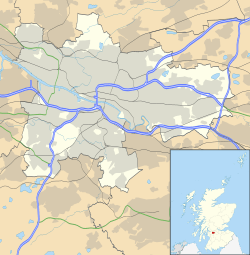Govandale Park facts for kids
| Location | Govan, Scotland |
|---|---|
| Coordinates | 55°51′54″N 4°18′50″W / 55.865°N 4.314°W |
| Record attendance | 10,000 |
| Surface | Grass |
| Opened | 1894 |
| Closed | 1912 |
| Tenants | |
| Linthouse F.C. (1894–1900) Benburb F.C. (1900–1912) |
|
Govandale Park was a football stadium located in Govan, Scotland. It was the home field for the Linthouse F.C. football team. They played there from 1894 until the team stopped playing in 1900.
Contents
A New Home for Linthouse F.C.
Linthouse F.C. moved to Govandale Park in 1894. Before this, they played at a place called Langlands Park. The new Govandale Park was right in the middle of Govan. This was different from their old ground, which was on the edge of town.
When the team moved in, they built a narrow stand for fans. This stand was on the south side of the field. They also built a small building called a pavilion. This was in the north-east corner of the park.
Playing in the Scottish Football League
In 1895, Linthouse F.C. joined Division Two of the Scottish Football League. The very first league game at Govandale Park was on August 17, 1895. Linthouse F.C. played against Airdrieonians and won 2–1.
Record Crowd
A few weeks later, on September 21, 1895, Govandale Park saw its biggest crowd ever. About 10,000 people came to watch a Glasgow Cup match. Linthouse F.C. played against the famous Celtic team. Celtic won that game with a score of 7–1.
The End of Linthouse F.C. at Govandale Park
At the end of the 1899–1900 football season, Linthouse F.C. decided not to continue in the league. Their last league game at Govandale Park was on March 10, 1900. They tied 2–2 with Motherwell. The club then stopped playing football later that year.
What Happened to the Park Next?
After Linthouse F.C. left, another football team took over Govandale Park. This was a new version of Benburb F.C.. They played there from 1900 until 1912.
In 1912, Benburb F.C. moved to a different ground. Over the next few years, the eastern part of Govandale Park became a playpark for children. The western part of the land was used by a shipbuilding company to expand their yard. Later, in the late 1900s, houses were built where the playpark used to be.
 | James Van Der Zee |
 | Alma Thomas |
 | Ellis Wilson |
 | Margaret Taylor-Burroughs |


